The demonstration of the gay community against the government in Tel Aviv (Avshalom Sassooni)
The expectations of consumers to take a political or social position from the brands they love have long since become an existing fact in the US and there are a variety of examples of brands that have profited, and also lost from such moves.
Last year the state of Florida came out with the new law Don't say gay which aims to avoid talking in schools about issues of sexual orientation among young children.Disney
, as the largest employer in Florida with approximately 77,000 employees at its many parks and hotels, has come under fire on social media for not issuing a public statement condemning the new law, despite being an equal opportunity employer , which advocates for inclusion and offers equal parental rights to all of its employees regardless of their sexual orientation.
It was the outrage on social media that caused Bob Chapek, the outgoing CEO, to issue a statement condemning the new law and explaining why Disney did not take a stand in the first place: "We thought it would be right to act behind the scenes to change the legislation and not make a public statement,"According to the CEO.
Does Disney have anything to lose by making such a public statement?
Certainly.
In the divided US, support for the LGBTQ communities means a decrease in market share and visits to Disney's websites by opponents of the various communities.
But she also has something to gain.
Disney is an American company that, in addition to being a huge employer in the US, also concentrates a lot of children's content within it. Therefore, it is required to address issues related to children and their encouragement for equality and self-expression. Generation Z expects the brands it likes to drive social change. It favors fair employment , diversity, inclusion and preserving the quality of the environment. Those who prefer to be "neutral", will catch fire on social networks that will cause them more harm than good.
And what about Israeli brands?
Tzvia Keren (Photo: Meli Arosti)
In Israel it seems that brands move lazily and enjoy broad support without having any need or reason to get involved in political matters.
How convenient it is not to take a stand and be a brand loved by everyone: religious, secular, members of the gay community, women, Arabs, Ethiopians and more.
But in the divided and divided Israeli society, will brands be able to continue to sit on the fence for a long time?
Last week we saw an unusual move by Discount Bank as a response to Knesset member Orit Struck's bill not to oblige businesses to provide a service that goes against their religious beliefs.
The bank announced, in an unusual move, that it would not grant credit to businesses that discriminate against customers.
The announcement made waves and very quickly a series of Israeli companies joined the bank, such as Microsoft Israel, Wiz, and the insurance company AIG.
Enthusiastic consumers have even started a website that aims to publish the list of companies that have come up with a social statement that opposes the new law.
While Discount Bank's statement "made sense" in the face of the idea that businesses that need credit would think twice about discriminating against customers on the basis of religious belief, the hundreds of statements that followed were out of context, to the point of "riding the wave" and an opportunity for self-publicity at the expense of the discrimination law.
So should Israeli brands take a stand on political issues?
Yes, but not always.
Consumers "smell" when they are being cheated.
They understand very well when it is a statement with real intentions behind it, and when it is lip service aimed at publicity.
In 2023, it is appropriate for brands to take a stand on issues that connect well with their daily activities.
Are you an energy company?
Take a position on the issues of reducing greenhouse gases.
Appealing to women?
Act against gender inequality.
Engaged in fashion?
Show us that the factories you work with enjoy adequate employment conditions.
The public, and Generation Z in particular, is no longer impressed by a logo in the colors of pride or the flag of Ukraine that has absolutely nothing behind it.
But if you show him that you are working to create a real change, address him from the place where you can really influence, and spare him empty statements, he will remain loyal forever.
Tzvia Keren is an employer branding manager at Fiverr.
Marketing and digital
in the headlines
Tags
Brands
Position 1
politics
discount
Disney
LGBT
gay community

